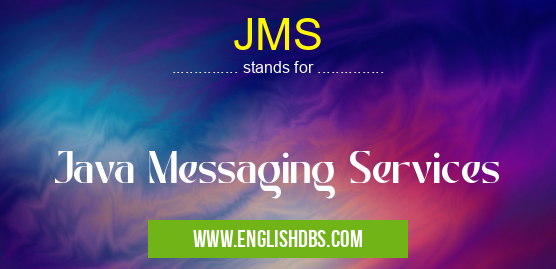What does JMS mean in SOFTWARE
Java Messaging Service (JMS) is an application programming interface (API) that enables software components to communicate with each other using asynchronous messaging through queues, topics, and Pub/Sub mechanisms. JMS is part of the Java Enterprise Edition platform and provides a simple yet powerful way for enterprise applications to communicate with each other. It allows applications to send and receive messages over a network without having to write their own code. By providing an API for applications to communicate with, JMS simplifies the process of developing distributed enterprise applications in Java.

JMS meaning in Software in Computing
JMS mostly used in an acronym Software in Category Computing that means Java Messaging Services
Shorthand: JMS,
Full Form: Java Messaging Services
For more information of "Java Messaging Services", see the section below.
What is JMS?
Java Messaging Service (JMS) is a Java-based message-oriented middleware API used for sending messages between two or more clients. It is part of the Java Platform, Enterprise Edition, and is designed to help developers create enterprise-level applications that use messaging as a communication mechanism between distributed components of an application. The most common form of messaging used by JMS is point-to-point or publish and subscribe messaging where one client publishes a message while another client consumes it.
How Does JMS Work?
At its core, JMS provides an interface between producers and consumers so that they can exchange messages reliably even if they don’t know each other’s identity. To do this, JMS uses the concept of destinations - either queue or topic objects which act like mailboxes in an email system. Producers put messages into the destination from which consumers may take them out when they are ready. Besides this basic messaging system, JMS also provides extra features such as error handling, transactions control, security authentication and authorization etc., as well as many optional settings that can be changed according to user needs.
Benefits of Using JMS
Using JMS has several advantages over traditional synchronous or RPC based communication methods such as lower latency due to asynchronous communication; better scalability due to loosened coupling between services; improved management capabilities - monitoring message flow; easier data integration due to standardised APIs technology independence; better fault tolerance thanks to reliable delivery mechanisms available within most implementations; improved flexibility due to non-intrusive integration etc.. In addition, it helps developers design large scale applications by separating components logically instead of making them interdependent on each other.
Essential Questions and Answers on Java Messaging Services in "COMPUTING»SOFTWARE"
What is JMS?
Java Messaging Service (JMS) is an API that provides the facility to create, send, receive, and read messages. It enables distributed communication that is loosely coupled, reliable, and asynchronous.
What are the advantages of using JMS?
The advantages of using JMS are numerous. It allows for asynchronous messaging which allows for a faster response time; it supports publish/subscribe messaging models which allow for greater flexibility; it also supports reliable messaging due to transactions and acknowledgment protocols; and lastly, it offers a platform-independent technology making it easy to integrate with other applications.
When should I use JMS?
JMS is typically used in situations where there is a need to communicate between two or more applications or systems asynchronously in an reliable manner. Examples include applications where events must be handled quickly such as trading applications or when integrating disparate systems together.
How do I access the JMS API?
The JMS API can be accessed using either a programming language like Java, a scripting language like Groovy or via API calls through web service calls such as RESTful APIs.
What type of messaging models does JMS support?
JMS supports both point-to-point (PTP) and publish/subscribe (pub/sub) messaging models. PTP is typically used when one application sends a message directly to another application whereas pub/sub model involves the creation of topics on which messages can be published and all subscribers will receive them.
What types of messages does JMS support?
JMS supports four types of messages – TextMessage, MapMessage, BytesMessage and ObjectMessage. TextMessages support languages like XML, JSON etc., MapMessages contain key value pairs, BytesMessages are used to send binary data and ObjectMessages are used to send object instead of bytes.
What protocols does the Java Message Service use for communication?
The Java Message Service utilizes TCP/IP protocol over sockets connections as well as HTTP protocol over dedicated ports for communicating over the network.
Is there any security built into the Java Messaging Service?
Yes there is some security built into the Java Messaging Service. Authentication measures can be taken such as user name & password combos as well as encryption techniques like SSL & HTTPS.
Final Words:
In conclusion, Java Messaging Service (JMS) is a widely used application programming interface (API) which provides message-oriented middleware functionality for distributed systems allowing different services/components within an application to be decoupled from each other and exchange information via asynchronous messaging queues or topics. The benefits of using this API include better performance through lowered latency and improved scalability as well as improved manageability, integration abilities and flexibility across platforms.
